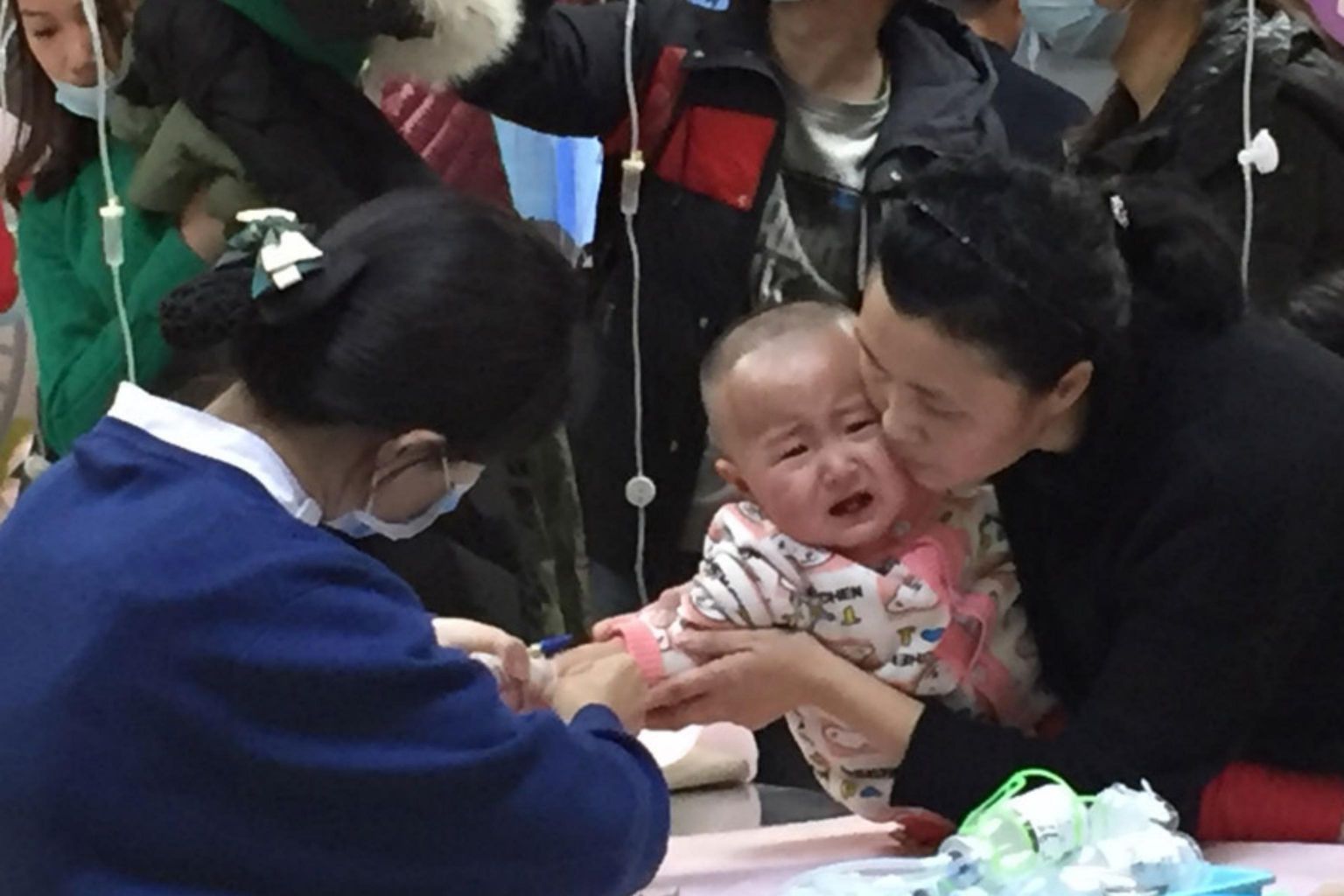China's flu season trailing off but one hospital has to close clinic due to doctor shortage
Sign up now: Get ST's newsletters delivered to your inbox

A child with the flu is given an intravenous drip at Beijing Children's Hospital, on Jan 10, 2018.
PHOTO: CHINA DAILY/ASIA NEWS NETWORK
Follow topic:
BEIJING (CHINA DAILY/ASIA NEWS NETWORK) - The peak season for flu this year (2018) has been spreading more aggressively than previous years, but it will trail off as usual at the start of the winter school vacation this month (January), according to a senior health official.
Hospitals and health clinics nationwide have seen increasing numbers of flu patients since the start of winter, Ms Jiao Yahui, deputy head of medical administration and supervision for the National Health and Family Planning Commission, said on Tuesday (Jan 9).
The mainland recorded 326 flu outbreaks - which involve 10 or more cases in each outbreak - in the last week of 2017, with no deaths reported, the latest data from the Chinese National Influenza Centre show.
In comparison, 42 flu outbreaks were reported during the last week of 2016, according to figures released earlier by the centre.
Mr Feng Zijian, deputy head of Chinese Centre for Disease Control and Prevention (CDC), said the dominant flu strain this winter is B/Yamagata, which had not been prevalent for many years.
This has caused a lack of immunity against the strain and made many people vulnerable, which is the major reason for the higher than average flu outbreaks this winter, he said.
The flu vaccines used in China, which are recommended by the World Health Organisation, can prevent three strains - H1N1, H3N2 and B/Victoria - the dominant strains in the previous years. However, they have limited effect against B/Yamagata.
"The dominant strains for each year may be different, and it is expected B/Yamagata will not be the dominant strain for flu outbreaks in the next one or two years," Mr Feng said.
The Chinese CDC is encouraging the development of vaccines that can prevent all four strains, and it is expected that at least one company on the mainland will be able to produce such vaccines by the fall, he said.
Ms Jiao said research had not found a mutation of the flu virus, which means common medications available on the market are effective.
The commission has asked hospitals to take measures to increase the number of paediatricians on duty to cope with the increasing number of children with flu, she said.
"We have noticed reports that patients in some places cannot get common antiviral drugs for flu from the hospitals, and we will ask hospitals across China that have a shortage of medicines to make emergency purchases of such drugs to ensure adequate supplies," Ms Jiao said.
A major hospital in Tianjin has confirmed that it has been forced to close its paediatrics department due to a shortage of doctors.
News of the move by Tianjin Haihe Hospital broke when a netizen posted images online on Jan 7 of a notice pinned to a door leading to the children's clinic.
On Tuesday, the hospital's publicity office confirmed the closure to City Express, a local newspaper, and explained that the move had been taken because its three paediatricians had all gone on sick leave.
Paediatrics has been overwhelmed with patients since the start of the flu season in November (2017), according to the publicity office.
The head of the department took leave last month (December) for an undisclosed reason, leaving two doctors to see about 60 children a day, the hospital said.
Last week, the remaining paediatricians became ill, too, with one having caught the flu bug and the other developing a high fever.
Hospitals have reported record numbers of flu patients this winter, especially paediatrics departments.
The General Hospital of Tianjin Medical University has been receiving 1,000 to 2,000 sick children every day, while doctors at Beijing Children's Hospital saw 10,000 on its busiest day.
China has 118,000 paediatricians and is in need of 200,000 more, according to data from the National Health and Family Planning Commission. The current ratio is 0.53 doctors to every 1,000 children.
According to the City Express report, the Chinese Medicine Association said the workload for a paediatrician is 1.68 times that of a physician for adult patients, yet their income is substantially lower.
Spring and winter are the peak seasons for flu in China, but few develop into serious cases, said Ms Jiao.
Mr Feng, from the CDC, said it is difficult to prevent flu because it transmits through the air and by physical contact, but vaccines are the best prevention.
"We recommend groups at higher risk, such as children, the elderly and pregnant women, receive vaccines between August and November to prevent flu in the winter," he said.

